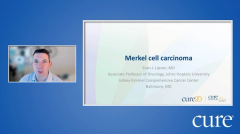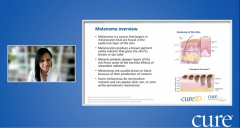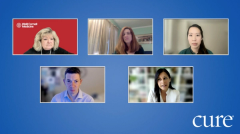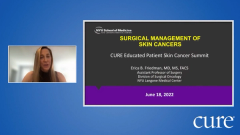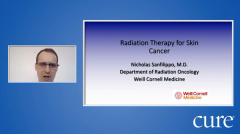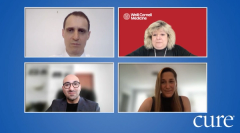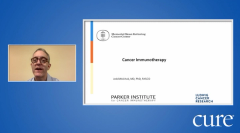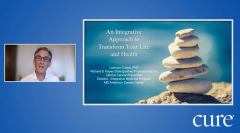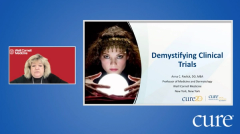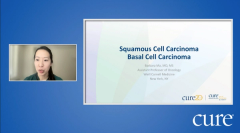
Educated Patient® Skin Cancer Summit Treating Skin Cancer Panel: June 18, 2022
Watch Dr. Jedd D. Wolchok, Lorenzo Cohen, Dr. Anna C. Pavlick and Julie Bain answer questions about treating skin cancer, during the CURE Educated Patient Skin Cancer Summit.
This panel was moderated by Kristie L. Kahl and featured Dr. Jedd D. Wolchok, Lorenzo Cohen, Dr. Anna C. Pavlick and Julie Bain, from the Skin Cancer Foundation.
Kahl: So Julie, I wanted to actually start with you. Could you just tell us a little bit about your journey with skin cancer and your family history?
Bain: Yes, I am sort of the poster child for risk. Not only because the red hair, fair skin, freckles, but also my sun exposure back when we didn't have all the great knowledge and products that we have now. So I'm also the poster child for early detection, because when I was 25 years old, was a long time ago, I had a little sore on my thigh that just was not healing, and it kept getting crusty and would bleed sometimes. And so I kind of pushed hard with my brother-in-law, who was an ear, nose and throat physician and said, “I think this is something, this could just be skin cancer.” And he's like, “Oh, you're too young.” But he did do a biopsy of it for me. And it was a basal cell carcinoma, and it was the first of many.
So I've, I've been vigilant and I eventually stopped you know, thinking that maybe if I just get a little more solid, get tan and be sexy and beautiful, like Farrah Fawcett or whatever. And stopped doing that, but a lot of damage was done. And so I believe my current count is 11 basal cell carcinomas and two squamous cell carcinomas, which are not nothing, they're a little scarier, and they're several of them on my scalp. Several things that were aggressive and reoccurred. So I've had a lot of Mohs surgeries, but luckily all of them were caught where I did not, you know, nothing had advanced to the level of a lot of what we've talked about earlier.
Kahl: Great. Thank you for sharing that. And Dr. Cohen, we had a question come in what are good fibers versus bad fibers? Or are all fibers like fiber bars? Are they all good?
Cohen: Well, you just threw in an option of fiber bar. So the best fibers are actually from the whole foods. So you know, things like grains, a great fiber is rolled oats or what you get from barley and millet, these whole grains. There's also a lot of fiber in the protein-based lagoons, soy beans and lentils and other kinds of pulses. Good fibers come from plant-based foods. And you can actually, you know, it's very easy to find on the internet, you know, the fiber content of different foods, Jerusalem artichokes, which are somewhat rare but now more popular, an amazing source of fiber. And the kind of follow up is wire the fibers foods important it's because the healthy bacteria that actually we know is related to increased health and in particular response to immunotherapy thrives and multiplies with These healthy fibers. And the opposite is also true, however, that a high sugar diet a high processed food diet, high red meat diet, actually will help the unhealthy bacteria to thrive in the body. And so again, the key is back to diversity. And it's focusing on on plant-based foods as a priority.
Kahl: Great, thank you. And Dr. Wolchok, we had a question. Would someone who's had a very aggressive lymphatic T-cell cancer still have a good reaction to immunotherapy?
Wolchok: It's a really important question. I think a little bit depends upon what the prior therapy is that the person has had and whether they were left with very much of an immune deficiency as a result of their prior treatment. But we certainly have seen people who've been treated for blood cancers who can still have excellent responses to immunotherapy for skin cancer.
Kahl: Great. Thank you, and Dr. Pavlick. So you talked a lot about all the great things and why we should consider clinical trials. But we often hear from patients about the misperceptions about a trial, like if I get a placebo it means I'm not getting treatments. So can you dispel some of those myths that we often hear about being on a clinical trial?
Pavlick: Sure. I think when it comes to placebo-based trials, people need to understand that those placebo-based trials are being done when the standard of care is to do nothing and to just watch patients. So if we do a trial, for example, with immunotherapy versus observation, those trials are being done in earlier stage melanomas where we routinely would not give patients treatment. And so that is the accepted standard. If you were to have advanced disease or to have metastatic disease, we don't treat those patients on placebo-controlled trials, we may offer them a state of phase 3 study, which means we're giving them a randomized trial, so I don't get to pick and the patient doesn't get to pick what treatment they get. But they will either get the research therapy, or they will get what's considered the current standard of care. So they will be getting some type of active therapy. So that's it's always a good question to ask when you participate in a trial and say, you know, does this have a placebo arm and 99% of the time the answer is no. But again, for the earlier stage trials, as we move immunotherapy further and further back to the earlier stages, there may be placebo because that's what's considered a standard.
Wolchok: Kristie, if I could just expand on Dr. Pavlick’s excellent answer. I think that the use of immunotherapy in earlier stage disease is a really current topic of discussion among many of us, because, of course, we all firmly believe that if there's a treatment that can help with long-term survival from, you know, even earlier stage melanoma that we should think about that but, you know, an open question still is whether the side effects from that treatment are offset by a significant benefit in overall survival. And that's why I think observation alone is still you know, a fair comparison. And even now that people have the option of getting immunotherapy and earlier stage disease, it's still not clear whether these medicines that we have available to us work better in earlier stage disease versus later stage disease. I think what many of us are hoping for is that we have better tools to predict recurrence so that we're not treating people who've already been cured by surgery, with medicines that have the possibility of causing real harm.
Kahl: Absolutely. And Dr. Wolchok, or Dr. Pavlick maybe even, Is there any word on the drug dostarlimab in relation to melanoma especially stage 4 disease?
Wolchok: Dostarlimab is in this class of anti-PD-1 drugs. It's not clear to me that it's different from (Keytruda [pembrolizumab]) or (Opdivo [ipilimumab]) which are both approved to treat melanoma or (Libtayo [cemiplimab]), which is approved to treat squamous cell cancer. I think it got a lot of appropriate media attention because of a small study in people with rectal cancer, resulting from an inherited deficiency of the ability to correct random genetic damage, where all of the patients, which were 12, had complete responses, which is wonderful, but it's not clear that that result would have been different with another member of the same class of medicines, which folks with advanced skin cancer have access to already.
Kahl: Okay, great. And we just have time for one more question. Julie, I wondered if you could share with us any resources available at the Skin Cancer Foundation for our patients be able to maybe look up after today's summit?
Bain: You bet. Yes, we call ourselves a small but mighty foundation. We're less than 20 people, but we serve millions of people on our website, skincancer.org and through our public education materials, brochures, magazines, blog, and our events and, you know, campaigns. So it's all available out there. And I just want to say we also give research grants, and it's an honor to be on this panel with Dr. Wolchok, who we awarded a grant in 2011. For him to investigate. Ipilimumab with I think it was a BRAF inhibitor. And he's been such a pioneer in this field and making such a difference. And so every year we do we give research grants as well. And we focus on all the skin cancers. So yeah, it's a great honor to be on with our great presenters and topics today, it's my job to absorb information like this and then translate it out as a longtime former journalist. That's, that's what I do.
This transcription was edited for clarity.
For more news on cancer updates, research and education, don’t forget to

